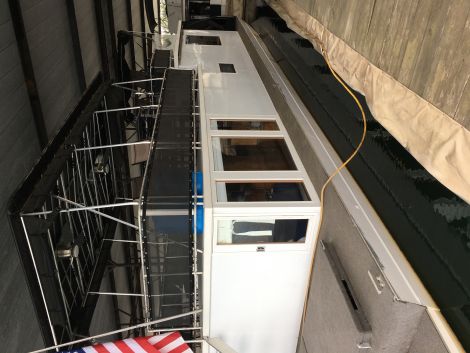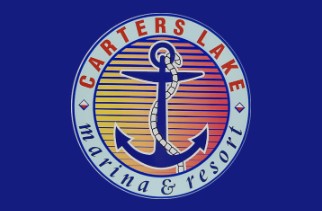Visit our new Boats for Sale in Georgia page:
Modify Search
|
|
Used Houseboat for sale |
|
|
Used Houseboat for sale |
|
|
Used Houseboat for sale by owner |
Houseboats for sale in Atlanta, Georgia by Manufacturer
An Introduction to Houseboats: Finding Your Ideal Houseboat for Sale - Article Summary
Our full article on Introduction to Houseboats by Captain Bill Rountree offers a more detailed guide on houseboats and can be found at the link at the bottom of this article. Imagine waking up to the gentle rocking of waves, surrounded by stunning natural scenery. This is the allure of spending time on a houseboat – a unique lifestyle that combines the comforts of home with the freedom of life on the water. Whether you're a seasoned boater or a newcomer to the world of houseboating, finding the perfect houseboat for sale can unlock a world of adventure and tranquility.
From cozy rental houseboats ideal for weekend getaways to luxurious floating homes designed for permanent living, this article will guide you through the different types of houseboats available, popular destinations for houseboating, essential equipment and safety tips, and how to plan an unforgettable houseboat trip. Get ready to embark on your journey as you explore the exciting possibilities of buying a houseboat.
Different Types of Houseboats
Houseboats come in a variety of styles and designs, catering to different lifestyles and preferences. Here are some of the main types of houseboats:
Traditional Houseboats These houseboats, often seen moored along the canals of cities such as Amsterdam, Utrecht, or Haarlem, have been used since the Second World War. They were initially created to address the increasing demand for housing and the lack of available space. Many of these traditional houseboats were converted from old cargo ships belonging to the Dutch fleet that had fallen into disuse. Today, these houseboats have been finely restored, retaining authentic elements that evoke their rich history while offering modern comforts like heating, solar panels, and fiber optic connectivity.Modern Houseboats Modern houseboats are a reality in the real estate market, providing a practical response to the scarcity of space in large cities and the increasing demand for ecological and technological solutions. These houseboats combine contact with nature, attention to sustainability, and luxury living. They offer innovative architectural and design solutions, often featuring:
- Lavish interiors with spacious lounges and well-appointed bedrooms
- Modern amenities like Jacuzzis, personal chefs, and onboard entertainment systems
- Personalized services, including customized itineraries and gourmet dining experiences
Luxury Houseboats Luxury houseboats take the concept of waterborne living to new heights of indulgence and exclusivity. These floating sanctuaries boast opulent interiors adorned with exquisite furnishings, creating an ambiance of sophistication and extravagance. Guests can expect:
- Enhanced comfort and exclusivity, with a focus on delivering a truly indulgent retreat on the water
- Tailored experiences and impeccable service, ensuring every aspect of their stay is curated to perfection
- Access to exclusive experiences and amenities without additional charges, such as onboard spa treatments or sunset cruises
Luxury houseboats are often positioned in the best locations, offering privacy and tranquility away from the crowds. They showcase elegant and contemporary designs with upscale decor, incorporating luxurious elements like fine upholstery, ornate fixtures, and stylish accents.
Essential Equipment and Safety Tips
Wearing a life jacket is the most important safety measure when it comes to houseboating. Ensure you have enough properly fitted life jackets for everyone on board, including children's sizes. Remind your guests and family members to wear their life jackets while on the houseboat or when participating in water activities near the boat. Remember, life jackets save lives!
In addition to life jackets, you'll need at least one floating device (Type IV) that you can throw to an individual in the water in case of trouble. This can be a cushion, a ring buoy, or another device, and it's better to have several. Some of these items may come with an attached line to pull a person closer to the boat.
Visual distress signals, such as flares or nighttime signals, are essential for boats under 16 feet, while boats over 16 feet must carry visual signals for both day and night use. Examples include orange or white smoke, aerial light flares (self-launching or requiring a flare gun), strobe lights, and flags.
Sounds can attract help both day and night, especially in fog. Portable or fixed horns and whistles count as sound-generating devices for all boats. Larger vessels (over 39 feet) should also carry a bell to be sounded at regular intervals in times of limited visibility.
Fire extinguishers are crucial for safety. Boats under 26 feet (including personal watercraft) need at least one B-1 type extinguisher, while boats 26 to just under 40 feet need two B-1 types or one B-2 type. Discuss with your family and guests how to operate an extinguisher: pull the pin, squeeze the handle, and aim at the base of the flames.
Anchoring Tools With so much investment literally riding on your anchor, your boat's anchoring system is no place to cut corners. Your choice of anchor depends on the size and type of your boat and the weather and anchoring conditions you generally encounter.
It's recommended to carry one anchor of sufficient size and strength to hold your boat for an extended period, like overnight or in an emergency situation. Additionally, having a second anchor of a different type can be beneficial, as no single anchor will work for every situation and there is always the possibility that you could lose an anchor either from chafing of the anchor line or by it getting caught on obstacles on the bottom of the water.
The general name for all the equipment you need to anchor your boat is "ground tackle." This includes an anchor, chain, line, and connecting elements. The anchor line, including chain, is called the rode.
Nylon three-strand line is the leading choice for use as an anchoring line. Lines generally come in a "soft" or "medium" lie, with tightly wrapped lines being the best choice for anchoring.
Chain may be used instead of nylon line for anchoring, providing added weight, chafe and wear resistance, and high strength. Combination anchor-rodes consisting of both chain and nylon line are also common.
Navigation Aids Unlike roads and highways, waterways do not have road signs to indicate location, routes, distances, or hazards. Instead, mariners rely on aids to navigation (ATONs), which are man-made objects used to determine position or a safe course.
These aids include buoys, day beacons, lights, lightships, radio beacons, fog signals, marks, and other devices. The Coast Guard is responsible for maintaining aids to navigation on U.S. waters under federal jurisdiction or serving the needs of the U.S. armed forces.
The "lateral" system in North America is the familiar "RED RIGHT RETURNING" system, meaning that on all navigable waters returning from sea, the red even-numbered marks are on the starboard (right) side of the channel, and the green odd-numbered marks are on the port (left) side. Numbers on the marks ascend when traveling from sea to harbor.
Safe Water Marks are used to mark fairways, mid-channels, and offshore approach points, while Isolated Danger Marks indicate a danger that may be passed on all sides. Special marks have no lateral significance and are used to mark special features or areas, such as anchorages, fishing grounds, or dredging/spoil areas.
Conclusion
The world of houseboating offers a unique blend of adventure, relaxation, and connection with nature. With proper planning, essential equipment, and adherence to safety guidelines, you can embark on an unforgettable journey, creating lasting memories on the water. Visit BoatersNet to explore our wide selection of high-quality used and new Houseboats from all of the top brands.
Click here to read our entire Introduction to Houseboats article!




